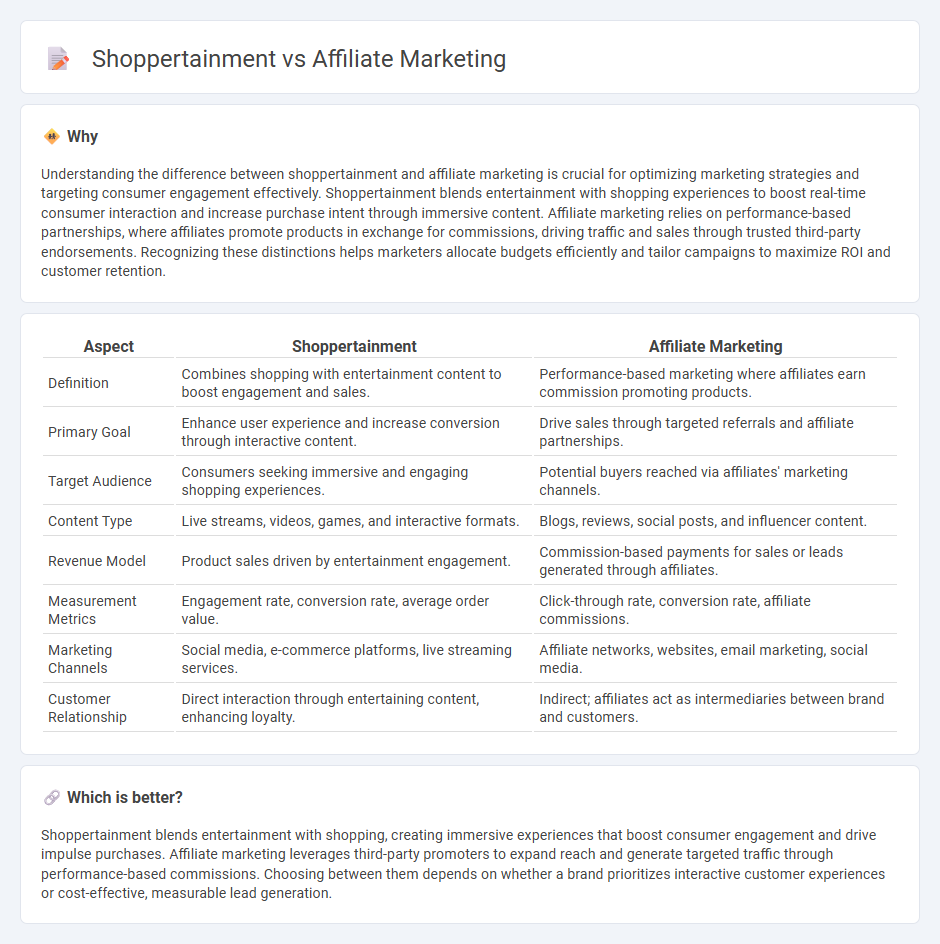
Shoppertainment combines shopping with interactive entertainment to enhance customer engagement and boost sales through live streams, videos, and gamified experiences. Affiliate marketing relies on partnerships where affiliates promote products and earn commissions for driving sales, focusing on performance-based results. Explore the unique advantages and strategies of shoppertainment and affiliate marketing to elevate your brand's growth.
Why it is important
Understanding the difference between shoppertainment and affiliate marketing is crucial for optimizing marketing strategies and targeting consumer engagement effectively. Shoppertainment blends entertainment with shopping experiences to boost real-time consumer interaction and increase purchase intent through immersive content. Affiliate marketing relies on performance-based partnerships, where affiliates promote products in exchange for commissions, driving traffic and sales through trusted third-party endorsements. Recognizing these distinctions helps marketers allocate budgets efficiently and tailor campaigns to maximize ROI and customer retention.
Comparison Table
| Aspect | Shoppertainment | Affiliate Marketing |
|---|---|---|
| Definition | Combines shopping with entertainment content to boost engagement and sales. | Performance-based marketing where affiliates earn commission promoting products. |
| Primary Goal | Enhance user experience and increase conversion through interactive content. | Drive sales through targeted referrals and affiliate partnerships. |
| Target Audience | Consumers seeking immersive and engaging shopping experiences. | Potential buyers reached via affiliates' marketing channels. |
| Content Type | Live streams, videos, games, and interactive formats. | Blogs, reviews, social posts, and influencer content. |
| Revenue Model | Product sales driven by entertainment engagement. | Commission-based payments for sales or leads generated through affiliates. |
| Measurement Metrics | Engagement rate, conversion rate, average order value. | Click-through rate, conversion rate, affiliate commissions. |
| Marketing Channels | Social media, e-commerce platforms, live streaming services. | Affiliate networks, websites, email marketing, social media. |
| Customer Relationship | Direct interaction through entertaining content, enhancing loyalty. | Indirect; affiliates act as intermediaries between brand and customers. |
Which is better?
Shoppertainment blends entertainment with shopping, creating immersive experiences that boost consumer engagement and drive impulse purchases. Affiliate marketing leverages third-party promoters to expand reach and generate targeted traffic through performance-based commissions. Choosing between them depends on whether a brand prioritizes interactive customer experiences or cost-effective, measurable lead generation.
Connection
Shoppertainment merges engaging content with online shopping experiences, driving higher consumer interaction and sales conversions. Affiliate marketing leverages this trend by incentivizing content creators to promote products within immersive entertainment formats, boosting traffic and revenue streams for retailers. The synergy between shoppertainment and affiliate marketing enhances brand visibility and customer engagement through targeted, interactive campaigns.
Key Terms
Affiliate Marketing:
Affiliate marketing leverages performance-based partnerships where affiliates earn commissions by driving traffic or sales to a merchant's website through tracked links, optimizing ROI for advertisers. This digital strategy encompasses content marketing, influencer collaborations, and pay-per-click campaigns, facilitating scalable brand exposure. Explore deeper insights on how affiliate marketing can boost your business growth and revenue streams.
Commission
Affiliate marketing offers businesses a commission-based model where publishers earn a percentage of sales generated through their referral links, ensuring performance-driven payouts. Shoppertainment combines shopping with entertainment, often providing commission incentives tied to dynamic, interactive content that boosts consumer engagement and conversion rates. Explore how these commission structures can maximize your revenue potential in the evolving digital landscape.
Referral Link
Affiliate marketing leverages referral links to track customer purchases, rewarding affiliates with commissions for driving traffic to e-commerce platforms. Shoppertainment integrates live streaming and interactive content, using referral links to seamlessly convert viewer engagement into sales through real-time recommendations. Explore how optimizing referral link strategies can maximize revenue in both affiliate marketing and shoppertainment models.
Source and External Links
Affiliate Marketing 101: What it is and How to Get Started - Affiliate marketing is a strategy where affiliates earn commissions for marketing another company's products, involving the seller, affiliate, and consumer in a revenue-sharing process.
Amazon Associates Central - Amazon's affiliate program allows content creators and publishers to earn up to 10% commission by promoting millions of products through customized linking tools.
Affiliate Marketing Guide: All You Need To Know (2025) - Shopify - Affiliate marketing is a performance-based strategy where affiliates earn commission by promoting products or services, and beginners can start by picking a niche, choosing a platform, and joining relevant programs.
 dowidth.com
dowidth.com